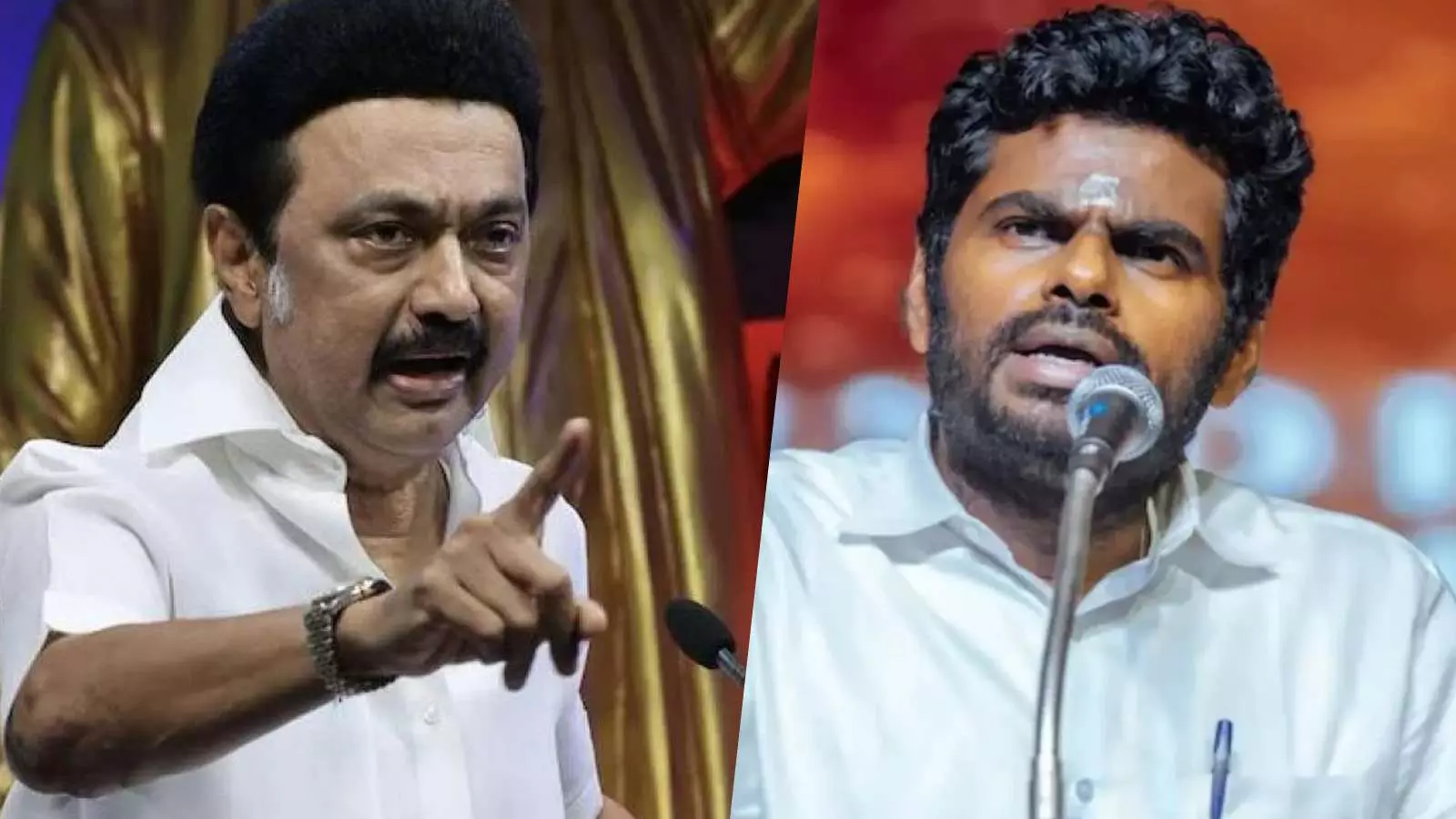
DMK-BJP face-off over SIR as Tamil Nadu braces for electoral roll drive
With the EC set to launch the SIR, the DMK and BJP have clashed over its timing and purpose, trading charges of voter suppression and hypocrisy

In a fierce attack on Tamil Nadu Chief Minister MK Stalin, former state BJP president K Annamalai criticised the DMK leader for what he called “double standards” in opposing the Election Commission’s Special Intensive Revision (SIR) of electoral rolls as a “conspiracy” to disenfranchise voters, given that the DMK had earlier supported similar voter roll revisions.
Also read | EC to begin electoral roll revision in TN by next week amid vote fraud allegations
Taking to social media platform X, Annamalai quoted Stalin's earlier post condemning the SIR, set to begin next week in Tamil Nadu, as a “hasty, opaque move timed perilously close” to the 2026 Assembly elections and during the monsoon season. Stalin had warned it would rob citizens of their rights and aid the BJP, drawing parallels to the alleged deletions of women, minorities, and SC/ST voters in Bihar that fuelled public suspicion.
Annamalai slams DMK ‘hypocrisy’
“Thiru Stalin's assumption that SIR is some conspiracy shows how hollow his understanding is,” Annamalai retorted in his post, which has garnered over 1,500 likes and 35,000 views. He highlighted that intensive revisions of electoral rolls have been conducted 13 times across India since 1952, including in 2003 and 2004, making it far from unprecedented.
The BJP leader further exposed what he called DMK's “selective amnesia,” recalling how the party in 2016 claimed there could be 57.43 lakh bogus voters in Tamil Nadu's rolls and urged the Madras High Court to purge absent, deceased, or shifted names ahead of the RK Nagar bypoll. In 2017, the DMK even pushed for statewide revisions, Aadhaar-voter ID linkage, and door-to-door verifications, positions now conveniently forgotten, Annamalai charged.
Dismissing Stalin's reliance on Bihar Opposition leader Tejashwi Yadav's claims of targeted deletions as “imagination,” Annamalai stressed: “The sanctity of democracy rests on the integrity of the electoral roll, and one hopes that the DMK rediscovers this wisdom.”
Stalin vows fierce resistance
Stalin vowed resistance to what he termed “vote theft”. He discussed with alliance partners and an all-party meeting on November 2 to chart a response, declaring: “The right to vote is the foundation of democracy. Tamil Nadu will fight against any attempt to murder it, and Tamil Nadu will win.” The chief minister’s rhetoric escalated during a speech at a DMK training session on Tuesday, where he urged party workers to vigilantly monitor SIR operations. “We must keep a watchful eye on the SIR activities that dare to snatch away people's voting rights. All genuine voters must be included in the voter list. Ensuring that is your responsibility,” he said.
Also read | SIR in TN: Amid BJP vs DMK, EC meeting with parties likely on Oct 28 in Chennai
Turning his guns on Opposition leader and AIADMK chief Edappadi K Palaniswami (EPS), Stalin mocked him as an opportunist who “fell at Amit Shah's feet and surrendered” his Dravidian credentials by allying with the BJP. “Neither the people of Tamil Nadu nor his own party members like that alliance! Other parties didn't join – VCK, Communists, Congress – he tried every day, but no one went. The people aren't even ready to believe what he says,” Stalin said.
He called on DMK cadres to expose EPS’s “anti-Tamil Nadu” opportunism, win back disillusioned voters, and convert their trust into alliance votes. Framing the political battle starkly, Stalin declared: “The 2021 election freed Tamil Nadu from the slavery of the AIADMK gang. The 2026 election is to protect Tamil Nadu from the BJP-AIADMK gang.”
DMK MP NR Elango told The Federal, “The BJP was set to remove minority votes through SIR, a ploy, the BJP and AIADMK believed, would hand them victory. However, DMK functionaries won’t allow it to happen. We will fight legally against their move.”
Experts flag electoral concerns
Senior journalist Savithri Kannan highlighted the Election Commission's (ECI) actions in Bihar as a source of deep suspicion for the DMK, underscoring legitimate grounds for the party’s unease. Speaking to The Federal, Kannan warned that the DMK is leveraging the SIR controversy for electoral gains, and given perceptions of ECI bias, the public is likely to side with the ruling party's narrative. He noted that many voters, particularly those who have recently updated their addresses, are struggling to verify their eligibility due to the confusion.
Veteran journalist T Ramakrishnan offered a measured take on the escalating SIR row, cautioning that while the controversy may not translate into a surge in DMK's vote share, it provides the ruling party a potent tool to craft a strong anti-BJP narrative ahead of the 2026 Assembly elections.
Also read | AIADMK, DMK clash over voter roll revision in poll-bound Tamil Nadu
According to a senior journalist Priyan, SIR exercises could pose massive challenges in states like Assam, Bihar, and West Bengal, where demographic sensitivities run high. Tamil Nadu is unlikely to face widespread disruptions on the same scale. However, he flagged a practical hurdle: for individuals born after 2002 seeking registration as new voters, demands for parental birth certificates could create unnecessary barriers, complicating the process for many families.
Citing Bihar as a cautionary tale, Priyan revealed that of the approximately 65 lakh names deleted from the rolls, around 35 per cent were Muslims, with an even higher proportion of women affected. “The directive emphasises that election officers must ‘gain confidence’ in the entries,” he explained, cautioning that this vague criterion could empower individual officials to wield discretionary power, potentially leading to arbitrary decisions. As Tamil Nadu braces for its own SIR rollout next week, his insights amplify the growing chorus of concerns over electoral integrity ahead of the 2026 polls.

